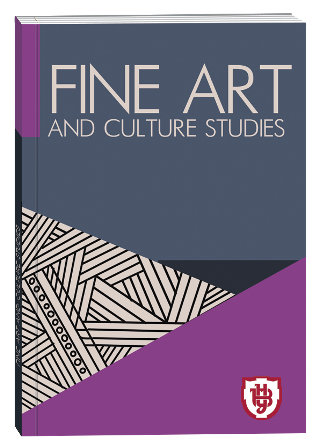THE IMAGINARY CONTENT AND MUSICAL LANGUAGE OF HANNA KHAZOVA’S CANTATA “GIVE US, GOD!”
DOI:
https://doi.org/10.32782/facs-2022-3-4Keywords:
cantata, Ganna Khazova, composers of Zaporizhia, sacred music, images of war, philosophical content, musical language and composition.Abstract
The article is devoted to determining the semantic and linguistic-compositional specifics of the cantata “Give us, God” by the modern Zaporozhian composer Ganna Khazova in the general context of her work. The purpose of the work is to determine the peculiarities of the author’s embodiment of the philosophically-poetic content and the composition and musical language of G. Khazova’s cantata “Give us, God”. The research methodology is based on a set of methods of musicological analysis (semantic-interpretive, compositional-dramaturgical, structural-functional, genre-stylistic). The relevance and scientific novelty of the study is due primarily to the fact that the composer creatyvyty of Ganna Khazova, despite her significant artistic value, is still poorly studied in Ukrainian musicology. Conclusions. Contemporary Zaporizhzhia composer Anna Khazova is a talented continuation of the traditions of Ukrainian spiritual music, making a significant contribution to the revival of national consciousness. Her music sounds far beyond the Zaporizhia region and inspires the soul to preserve human values, strengthen the will and dignity of the citizens of Ukraine. One of the best works of the author is the cantata “Give us, God” (2016), created in the high spiritual and artistic traditions of European and Ukrainian music. Especially relevant in this work there is his active anti-war humanistic orientation, which is gaining great strength in our time, when the land of Ukraine again entered the war. Musical-dramatic and linguistic-compositional features of the cantata are determined by the embodiment in this work of the main images and ideas of the verbal-poetic text. Prospects for further research on this issue are associated with a careful analysis of other works by G. Khazova and the definition of genre and style specifics of her composer creatyvyty.
References
Антоненко А. Н. Творчество композиторов Запорожского края в контексте развития хоровой культуры региона (конец XX – начало XXI века). Культурная жизнь Юга России. 2013. № 4. С. 13−17.
Боєва Н. НСКУ «Композитори Запоріжжя запрошують…». Запоріжжя, 2018. 52 с.
Валік О. Сузір’я талантів запорізьких композиторів. Запоріжжя вечірнє. 2017. 11 травня.
Варакута М., Яковенко А. Композиційні особливості кантати « Дай нам, Боже» Г. Хазової. Актуальнi питання гуманiтарних наук. 2019. Вип. 23, том 3. С. 14−17.
Кеменчеджи Є.П. Духовні твори в композиторському доробку Ганни Хазової. Культура та інформаційне суспільство ХХІ століття. Харків, 2020. С. 63−65.
Мартинюк Т.В. Микола Попов. Мелітополь : Сана, 2003. 148 с.
Мартинюк Т.В. Музичний професіоналізм Північного Приазов’я ХІХ–ХХ століть. Мелітополь, 2003. 608 с.
Мартинюк Т.В. Сучасні композитори Запоріжжя (професійна музична культура Південного Cходу України). Наукові записки Тернопільського державного педагогічного університету ім. Володимира Гнатюка. Серія: Мистецтвознавство. № 1(4). Тернопіль, 2000. С. 48−52.
Таган Я.І. Творчий портрет Ганни Хазової. Соціально-гуманітарний вісник. Вип. 34. Харків, 2020. С. 83.
Філіппов О. Кантата «Дай нам, Боже» Г. Хазової для мішаного хору з оркестром: до питання інтерпретації поезії С. Дуня, В. Коваль та Н. Красоткиної на шляху творення словесно-музичного тексту. Музична наука на початку третього тисячоліття. Одеса, 2020. Вип. 10. С. 85−93.
Kemenchedgy Ye. P. Art project «Composers of Zaporizhzhia invite…» as a factor of the modern musical life of the region («Мистецький проект “Композитори Запоріжжя запрошують…” як чинник сучасного музичного життя регіону»). European Journal of Arts. Vienna. 2021. № 4. Pp. 40−46.







